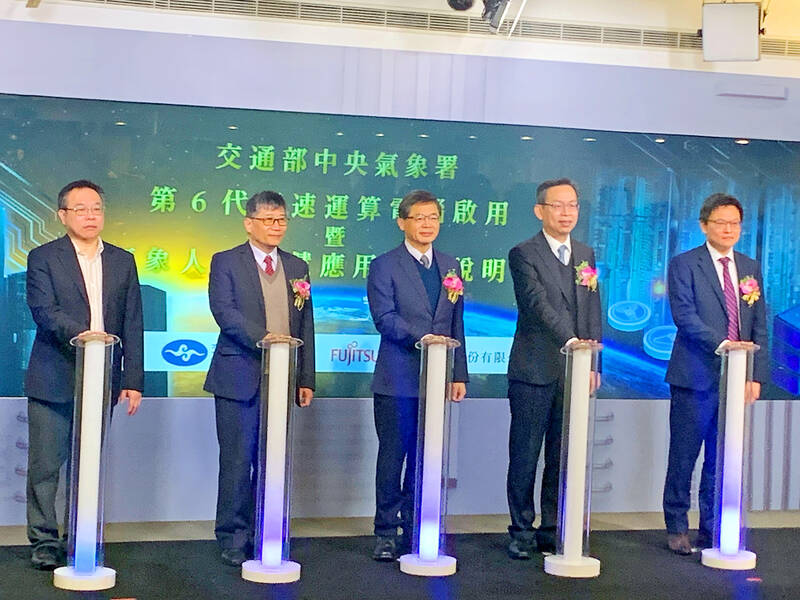The Central Weather Administration (CWA) yesterday began using a sixth-generation high-performance computing system that is expected to improve the accuracy of its weather forecasts.
The system is a Fujitsu FX1000 high-speed computer built with 7-nanometer chips made by Taiwan Semiconductor Manufacturing Co, the meteorology agency said.
It is also equipped with 192 of Nvidia Corp’s A100 graphics processing units to meet requirements for running artificial intelligence (AI) applications, the agency said.

Photo: Ting Yi, Taipei Times
The system has a total performance capacity of 10 petaflops, which is seven times greater than the CWA’s fifth-generation system and is equivalent to an aggregate computing capacity of about 46,000 desktop computers, the agency said, adding that it is ranked 69th among the world’s top 500 high-speed computing systems.
The agency began building the system in 2021 and completed it last year at a total cost of NT$1.5 billion (US$47.54 million), CWA Administrator Cheng Chia-ping (程家平) told a ceremony celebrating the launch of the new system.
“Taiwan has a rather complex topography, with changes in temperatures and rainfall varying greatly in different regions of the country. As such, high-resolution data are needed to produce accurate weather forecasts,” Cheng said. “With the use of a sixth-generation high-performance computer, we estimate that the horizontal resolution would be improved to 1km from 3km under the previous system.”
“The accuracy of weather and climate forecasts in countries around Taiwan would also be enhanced, with the resolution for the global weather model being improved to 13km from 25km previously,” he added.
The new system would allow the weather agency to produce typhoon forecasts 10 days before their arrival, Cheng said.
Under the old system, the agency could only begin making forecasts about tropical storms and typhoons seven days ahead, he added.
Although many countries are able to produce weather forecasts faster with the use of AI technology, training the AI system is a complicated and long process, Cheng said.
“We are using weather data collected from the areas around Taiwan as the basis for training the AI system, with the goal of developing a new high-resolution weather forecast model that applies to areas around the nation,” he said.

The first global hotel Keys Selection by the Michelin Guide includes four hotels in Taiwan, Michelin announced yesterday. All four received the “Michelin One Key,” indicating guests are to experience a “very special stay” at any of the locations as the establishments are “a true gem with personality. Service always goes the extra mile, and the hotel provides much more than others in its price range.” Of the four hotels, three are located in Taipei and one in Taichung. In Taipei, the One Key accolades were awarded to the Capella Taipei, Kimpton Da An Taipei and Mandarin Oriental Taipei. Capella Taipei was described by

EVA Airways today confirmed the death of a flight attendant on Saturday upon their return to Taiwan and said an internal investigation has been launched, as criticism mounted over a social media post accusing the airline of failing to offer sufficient employee protections. According to the post, the flight attendant complained of feeling sick on board a flight, but was unable to take sick leave or access medical care. The crew member allegedly did not receive assistance from the chief purser, who failed to heed their requests for medical attention or call an ambulance once the flight landed, the post said. As sick

The Taichung District Court yesterday confirmed its final ruling that the marriage between teenage heir Lai (賴) and a man surnamed Hsia (夏) was legally invalid, preventing Hsia from inheriting Lai’s NT$500 million (US$16.37 million) estate. The court confirmed that Hsia chose not to appeal the civil judgement after the court handed down its ruling in June, making the decision final. In the June ruling, the court said that Lai, 18, and Hsia, 26, showed “no mutual admiration before the marriage” and that their interactions were “distant and unfamiliar.” The judge concluded that the couple lacked the “true intention of

INDUSTRY: Beijing’s latest export measures go beyond targeting the US and would likely affect any country that uses Chinese rare earths or related tech, an academic said Taiwanese industries could face significant disruption from China’s newly tightened export controls on rare earth elements, as much of Taiwan’s supply indirectly depends on Chinese materials processed in Japan, a local expert said yesterday. Kristy Hsu (徐遵慈), director of the Taiwan ASEAN Studies Center at the Chung-Hua Institution for Economic Research, said that China’s latest export measures go far beyond targeting the US and would likely affect any country that uses Chinese rare earths or related technologies. With Japan and Southeast Asian countries among those expected to be hit, Taiwan could feel the impact through its reliance on Japanese-made semi-finished products and